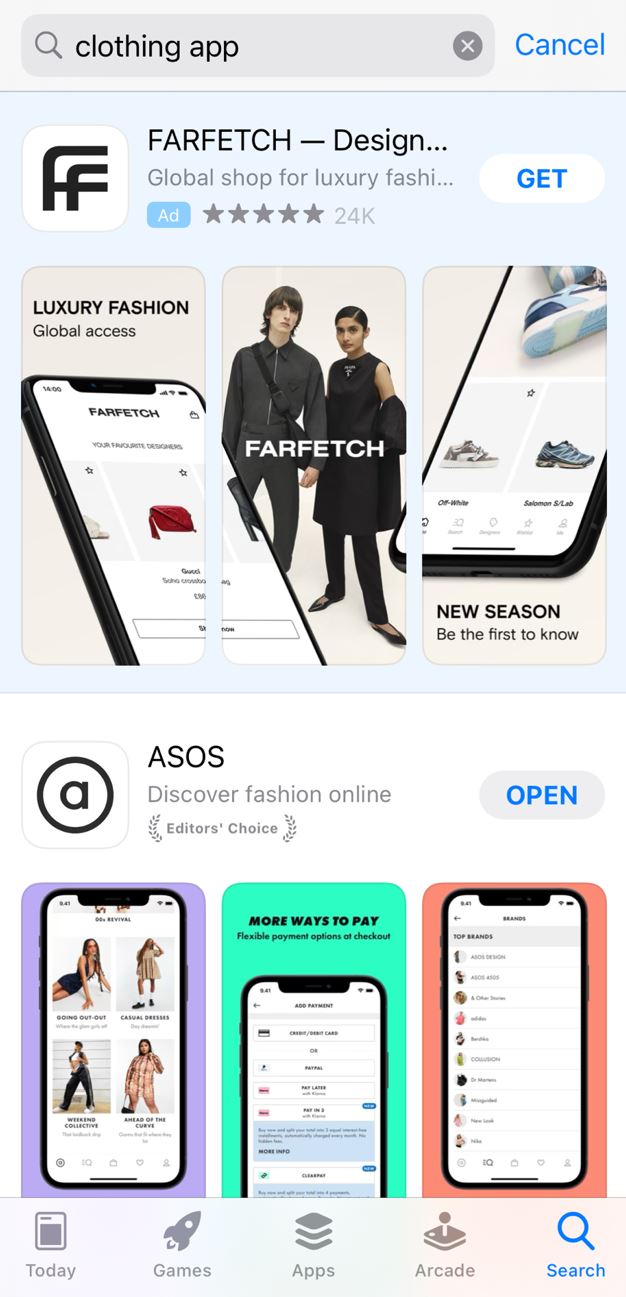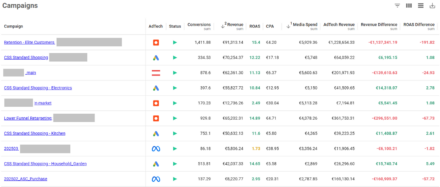A Quick Guide to Apple Search Ads

With around 46% of the UK owning iPhones, recent privacy changes caused by the Apple iOS updates have prompted advertisers to consider new avenues to reach iPhone users.
Apple Search Ads (ASA) allows advertisers to promote their app within the Apple App Store and track installs and their share of the mobile app advertising market has tripled in six months!
In this blog, I’ll cover:
- What Apple Search Ads are
- How Apple Search Ads work
- How to target on Apple Search Ads
- How to optimise your Apple Search Ads
- Other Apple Search Ads formats available
- Best practice tips
What are Apple Search Ads?
Apple Search Ads launched in 2016 and in recent months have seen huge growth with reports of it being responsible for 58% of all iPhone app downloads vs. 17% one year ago.
These ads appear at the top of the search results and are created using imagery within your app and are used to promote your app to users searching within the App Store.
How do Apple Search Ads work?

There are two solutions available to advertisers looking to use ASA: basic and advanced.
Basic allows you to spend up to $10,000 a month per app promoting a maximum of 50 apps. However, this solution is very automated matching your ads to relevant users with no control over keywords or audience targeting.
Advanced gives advertisers more control over targeting, search terms and more. Campaign set up is similar to regular search ads as they use keyword targeting (with the match type options of broad or exact).
There is also the option to set up a search match ad group which uses your apps content instead of keywords, similar to Dynamic Search Ads.
Your ad will only show if you win the auction which is dependent on your keyword bid and Apple’s algorithm which looks at how relevant your app is to the user.
Ads are created using the assets already available within your app and listing making set up quick and easy!
What targeting options are available?
Targeting options on ASA are fairly limited. Currently, advertisers can use the following criteria to target their ads:
- Location
- Device (e.g. iPhone, iPad)
- Customer Types (e.g. new vs. returning users)
- Demographics (e.g. age, gender)
- Ad Scheduling
How can I optimise Apple Search Ads campaigns?
Apple does not currently offer any automated bidding solutions meaning bidding has to be carried out manually at keyword level.
The platform gives a suggested bid range, for example £1.90 – £3.28, and gives your bid a strength rating (red, amber green).
Using these metrics and your core performance metrics, such as install rate, will allow you to make informed bid changes.
Unfortunately, they provide no insights in terms of impression share or what other competitors are bidding in the auction.
Search term reports are available allowing advertisers to add negative keywords at ad group or campaign level.
Tip: I would highly recommend adding negative keywords, especially if you use broad match or search match ad groups.
Are there any other ad formats I can use on ASAs?
Yes, earlier this year Apple announced a new ad format that promotes your app before a user searches.
The new placement is found the app stores search tab under suggested apps. Using this placement is easy as it does not require keywords or creative assets as the ad takes advantage of the assets already available in the app.
You cannot use audiences with this ad format only the targeting options mentioned earlier (location, age, etc.). It is unclear exactly how Apple decides who to show the ad but it is though to be using data apple has about the user.
This format is billed on a CPM basis and there is no minimum spend required.
Best Practice Tips
If you’re looking to get started with ASA, here are a few of my top tips:
- Before you launch your campaigns make sure the review your app metadata as this will form the basis of your ad.
- Have separate campaigns for brand, generic and competitor searches using negative keywords to avoid cross matching.
- Split ad groups by match type excluding exact match keywords from broad match ad groups to ensure searches are matching with the best keyword and correct bid.
- If you wish to target both new and returning users, I would recommend having separate campaigns for these users to allow separate budgets to be allocated. It will also make reporting easier as you can quickly determine how many installs are from new users vs. existing uses redownloading.
Want to find out more about how Apple Search Ads work?
Get in touch with the paid media team today!
Own your marketing data & simplify your tech stack.
Have you read?
Chrome’s announcement on dropping cookie opt-in last month closed the door on a 5 year saga for marketers. But what is the landscape like in 2025 for cookie-based measurement?
Generative AI is transforming the way that marketers plan and assemble content for their Paid Ads. As big platforms like Google, Meta and TikTok increasingly build the tools needed to...
In a surprising move that has sparked heated debate, Mark Zuckerberg announced on his Instagram that Meta will be reducing its levels of censorship and in particular fact-checking on its...



